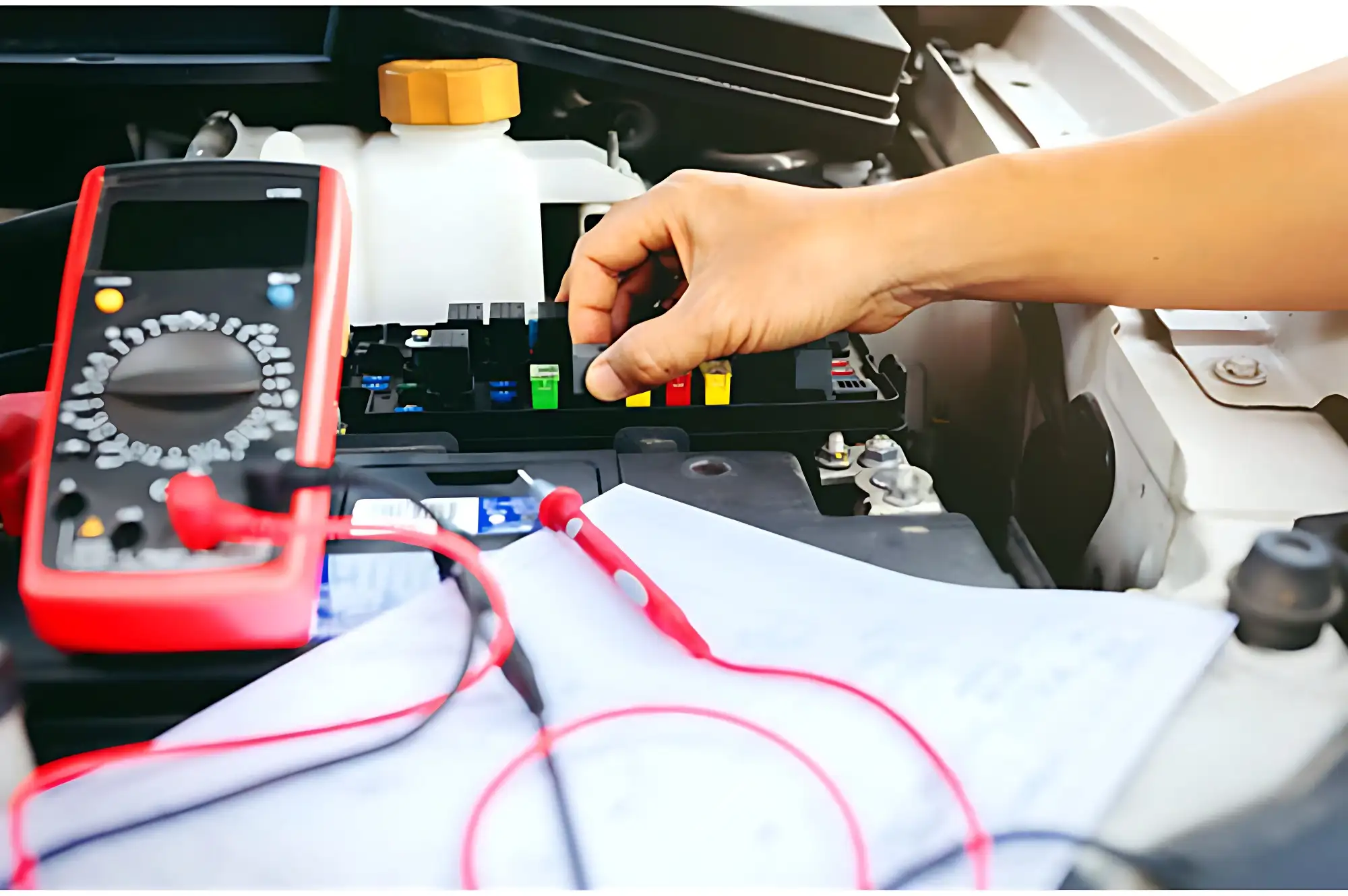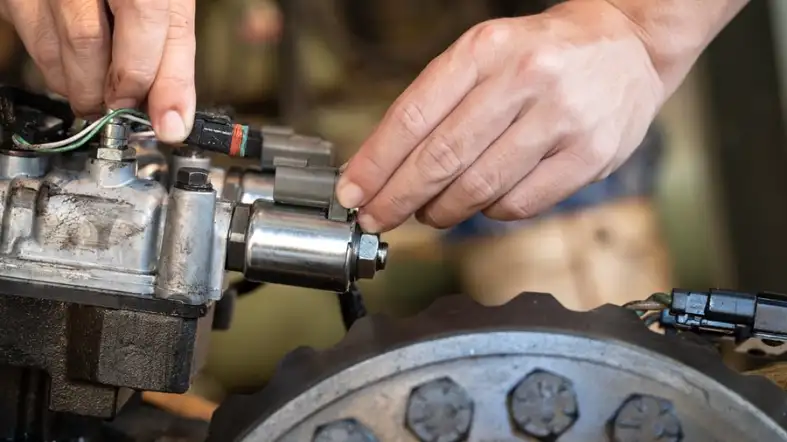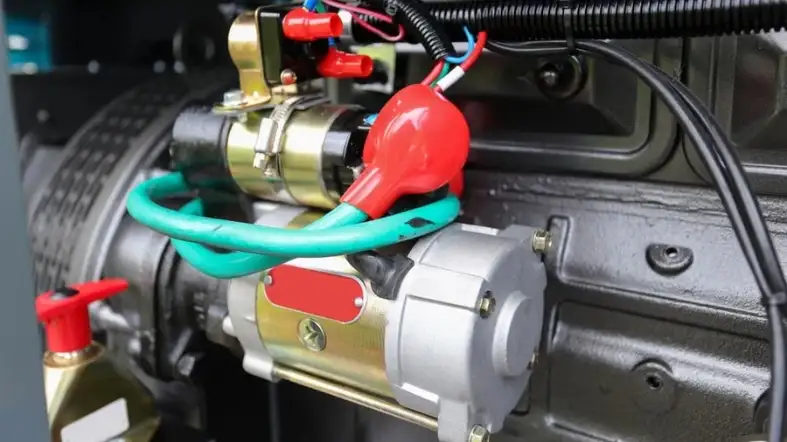Your car’s starter is essential for igniting the engine and getting you on the road. But what happens when it’s not working correctly?
A bad starter can cause a host of problems, from slow cranking to total engine failure.
In this blog post, we’ll explore the signs that indicate a bad starter and what you can do to fix it.

How do you know if you have a bad starter?
Here are some common signs of a bad starter:
1. Grinding noise:
When you try to start your car, if you hear a grinding noise coming from the engine, it could be a sign that your starter is failing.
This could be because the starter’s gear teeth are worn out, or there is a problem with the starter motor.
2. Clicking sound:
Another common symptom of a bad starter is a clicking sound when you turn the key in the ignition.
This could indicate that the starter solenoid is failing to engage, which means that the starter motor is not receiving the necessary electrical power to start the engine.
3. Slow crank:
If you notice that the engine is cranking slowly or struggling to start, it could be a sign that the starter is failing.
This could be because the starter motor is not receiving enough power, or there is a problem with the starter relay.
4. Smoke:
If you see smoke coming from the engine or smell a burning odor, it could be a sign that your starter is failing.
This could be due to the starter motor overheating, which could lead to further damage to the starter and other components of your vehicle.
5. Warning lights:
Some cars have warning lights that indicate when there is a problem with the starter.
If you see the “Check Engine” or “Battery” light on your dashboard, it could be a sign that there is a problem with your starter.
How to fix a bad starter?

Here are some steps to follow:
1. Check the battery:
Make sure your car’s battery is fully charged and in good condition. If the battery is weak, it can put extra strain on the starter and cause it to fail.
2. Test the starter:
Use a voltmeter to test the starter’s voltage. If the reading is low, the starter may be defective and need to be replaced.
3. Check the connections:
Inspect the connections between the starter and the battery, as well as the ground wire. Make sure they are tight and free of corrosion.
4. Tap the starter:
Sometimes, a starter will get stuck and won’t turn over. You can try tapping the starter gently with a hammer or a wrench to see if it frees up.
5. Clean the starter:
Dirt and debris can accumulate on the starter and cause it to malfunction. Use a wire brush to clean the starter and remove any buildup.
6. Replace the starter:
If none of the above steps work, you may need to replace the starter. This is a more involved process, but it can be done with the help of a repair manual and some basic tools.
What are the reasons behind a bad starter?

However, there are several reasons why a starter might not work properly, including:
1. Dead battery:
If your car’s battery is dead, the starter won’t have enough power to turn the engine over. This is often the most common reason for a bad starter.
2. Faulty starter motor:
If the starter motor itself is faulty, it may not be able to turn the engine over, even if the battery is fully charged.
This can happen due to wear and tear or damage to the motor’s internal components.
3. Bad starter solenoid:
The solenoid is responsible for engaging the starter motor when you turn the key.
If the solenoid is faulty, it may not be able to engage the motor, preventing the engine from starting.
4. Wiring issues:
The starter system relies on a series of wires and connections to function properly.
If there are any issues with the wiring, such as a loose or corroded connection, the starter may not work.
5. Ignition switch problems:
The ignition switch is what sends power to the starter when you turn the key.
If the switch is faulty, it may not send the right amount of power to the starter, preventing the engine from starting.
6. Seized engine:
If the engine is seized, it won’t be able to turn over, even with a fully functional starter motor. This can happen due to a lack of oil or other mechanical issues.
FAQs
What Is A Starter In A Car, And What Does It Do?
A starter is a component of your car’s electrical system that is responsible for turning the engine over when you turn the key in the ignition.
It uses a small motor to engage with the engine’s flywheel, which in turn starts the engine.
What Are Some Signs That My Starter Might Be Going Bad?
There are several common signs that your starter might be failing, including a slow cranking sound when you turn the key, a clicking sound that the engine won’t start, or no sound at all when you turn the key.
You might also notice that your headlights or dashboard lights are dimmer than usual when you try to start your car.
Can A Bad Starter Drain My Car’s Battery?
Yes, a bad starter can sometimes drain your car’s battery if it is not able to start the engine efficiently.
This is because the starter will continue to draw power from the battery even if it is not able to turn the engine over.
Can I Jump-Start My Car If The Starter Is Bad?
No, you cannot jump-start a car if the starter is bad.
Jump-starting a car only provides the initial burst of energy needed to start the engine, but if the starter is not functioning properly, it will not be able to turn the engine over.
How Can I Diagnose A Bad Starter?
If you suspect that your starter is bad, you can try a few things to diagnose the problem.
First, check the battery to make sure it is fully charged and in good condition.
If the battery is fine, try tapping the starter lightly with a hammer or other tool while someone else tries to start the car.
If the engine starts after tapping the starter, it is likely that the starter motor is worn and needs to be replaced.
How Much Does It Cost To Replace A Bad Starter?
The cost of replacing a bad starter can vary depending on the make and model of your car and the type of starter you need.
On average, you can expect to pay between $300 and $500 for parts and labor.
Conclusion
Having a bad starter in your car can be a frustrating experience, but there are a few telltale signs to look out for.
If you hear a clicking sound when you turn the key, or if your engine cranks but doesn’t start, it’s likely that your starter is the culprit.
Other signs of a bad starter may include grinding noises, a burning smell, or a slow cranking sound.
If you’re experiencing any of these issues, it’s important to have your car inspected by a professional mechanic as soon as possible to avoid any further damage or safety concerns.
